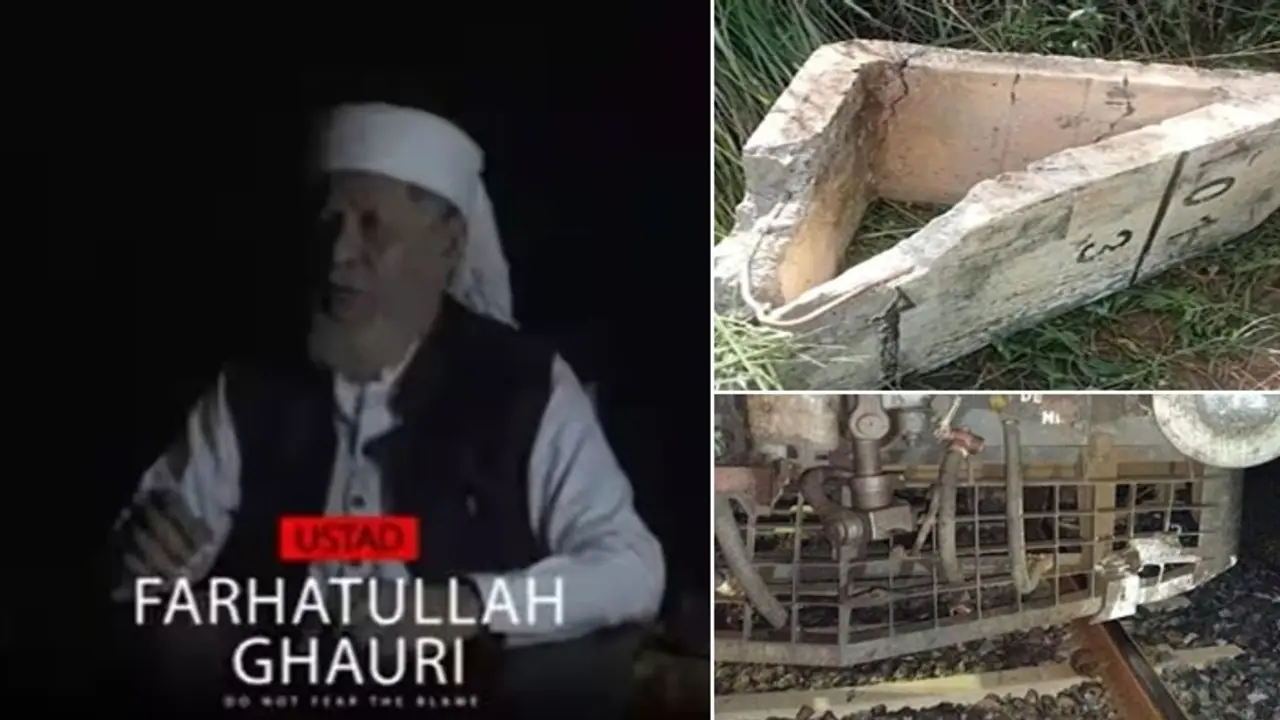In a critical incident that could have resulted in a severe disaster, unidentified assailants attempted to derail a goods train by placing two heavy cement blocks on the railway tracks in Rajasthan’s Ajmer district.
In a critical incident that could have resulted in a severe disaster, unidentified assailants attempted to derail a goods train by placing two heavy cement blocks on the railway tracks in Rajasthan’s Ajmer district. The train, operating late on Sunday night, struck the cement blocks but fortunately sustained no damage, managing to continue its journey safely.

The police were alerted to the incident after railway employees lodged a formal complaint. The employees had initially been informed that a cement block was discovered on the track near the site, leading them to investigate. Upon arrival, they found that the block had already been struck by the train and broken apart. A second cement block was also discovered further down the same track, potentially indicating a planned effort to derail the train.
Authorities swiftly registered a First Information Report (FIR) under the Railway Act and the Prevention of Damage to Public Property Act. The police have launched a full-scale investigation into the matter to identify and apprehend the culprits behind the act of sabotage.
This derailment attempt in Ajmer comes on the heels of a similarly dangerous incident in Kanpur, where the Kalindi Express, traveling from Prayagraj to Bhiwani, struck an LPG cylinder deliberately placed on the railway tracks. The train’s loco pilot narrowly avoided disaster by bringing the train to a halt upon spotting the cylinder, along with other suspicious items such as a petrol bottle and matchboxes placed along the tracks.
The Kanpur police have since registered an FIR and detained six individuals for questioning in connection with the incident. BJP spokesperson Gaurav Bhatia condemned the events, stating that India’s strength under Prime Minister Narendra Modi’s leadership would "eliminate those who conspire against the country." Bhatia criticized elements seeking to disrupt peace and security in the nation, promising firm and decisive action against those responsible.
The two thwarted attempts follow closely on the heels of a significant incident involving the Sabarmati Express passenger train. Less than a month ago, 20 coaches of the train, bound for Ahmedabad, derailed near Govindpuri station in Kanpur after its engine struck an “object placed on the track.” Fortunately, all passengers were safely rescued, and no casualties were reported.
Is terrorist Farhatullah Ghori behind recent spate of train derailment attempts?
The recent series of train derailment attempts follows the emergence of a video featuring terrorist Farhatullah Ghori. In the video, Ghori urges sleeper cells in India to execute coordinated attacks on the country's railway system. Ghori, a known jihadist with links to Pakistan’s Inter-Services Intelligence (ISI), reportedly orchestrated the Rameshwaram Café blast in Bengaluru earlier this year.
Last month, in a chilling video released via Telegram, he urged sleeper cells to sabotage India’s railway network, detailing methods to derail trains using explosive devices such as pressure cooker bombs.
"Target petrol pipelines, their logistics chain, and the collaborators... disrupt the railway lines, their transport system... These will precipitate chaos," Ghori proclaimed. "The govt is targeting our properties through ED and NIA, but remain steadfast, we will usurp power sooner or later," the terror recruiter currently on the most wanted list of the intelligence establishment added.
In the three-minute video, Ghori also called for a "fidayeen war" or suicide attacks, urging his followers to target Hindu leaders and police personnel. "Experiment with different tactics to ascertain what works... where they are most vulnerable," he stated, further escalating the threat level.
Indian intelligence agencies have been viewing the video as part of a broader strategy by Pakistan's Inter-Services Intelligence (ISI) to foment unrest and communal tension in India, especially in light of Ghori's sudden re-emergence on the scene.
Ghori has been involved in numerous high-profile attacks, including the 2002 Akshardham Temple attack in Gujarat and the 2005 suicide bombing on the Task Force office in Hyderabad. He continues to use online platforms for recruitment and propaganda, galvanizing radical groups and sleeper cells across India.
Indian authorities have linked Ghori’s network to several terrorist attacks, including the Rameshwaram Café blast in March 2024, which injured at least 10 people. Two key suspects, Abdul Matheen Ahmed Taahaa and Mussavir Hussain Shazib, were arrested in connection with the blast, both believed to be members of an Islamic State (IS) module based in Karnataka. Ghori’s son-in-law, Shahid Faisal, is believed to have acted as the handler in this case, maintaining close ties with the accused.
The recent foiled attempts in Ajmer and Kanpur highlight the urgent need for increased vigilance and security measures to protect vital infrastructure from deliberate sabotage.
As the authorities investigate these foiled derailment attempts, the threat of terrorism looms large, particularly in the wake of Ghori's incitement to attack India’s railway system. Security agencies, bolstered by intelligence inputs, are expected to remain on high alert as they work to thwart these malicious efforts aimed at destabilizing the nation’s transport infrastructure.
